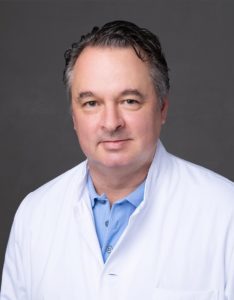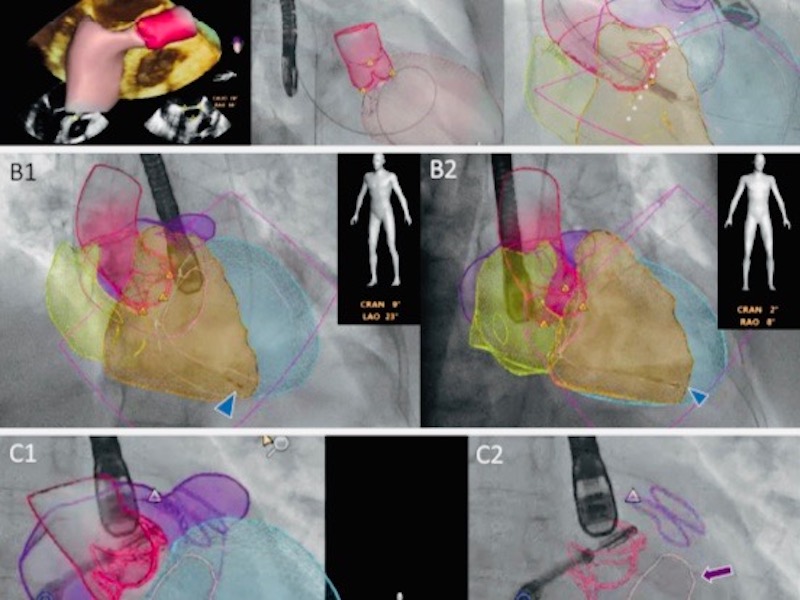Structural heart disease
05 January 2019
What are structural heart disease?

Prof. Dr. med. Peter M. Wenaweser - Interventional Cardiology - HerzKlinik Hirslanden
Structural heart disease refers to diseases of the heart that predominantly affect one of the four heart valves, i.e. the aortic, mitral, tricuspid and pulmonary valves. The most common structural heart diseases include aortic valve stenosis and mitral valve regurgitation. They usually occur in older people.
Aortic valve stenosis is a narrowing of the heart valve located in the aorta. The narrowing can be caused by both inflammation and calcification. The result is an overload of the heart muscle because the heart has to pump faster. In mitral valve regurgitation, the heart valve does not close properly and leaks. Structural heart disease can only be treated surgically.
What is the difference between a stenosis and an insufficiency?
Heart valves are functionally nothing more than a one-way valve. They regulate the blood flow in the heart in the right direction. The heart, as a blood pump, can only direct blood flow correctly if the valves are functioning normally. A heart valve can become narrowed and obstruct blood flow for a variety of reasons. This is called valve stenosis. A heart valve can also leak, causing blood to be pumped back through it. This is called an insufficiency. There are also mixed forms in which a heart valve has a stenosis and an insufficiency at the same time, with varying degrees of severity.
What symptoms and complaints are typically experienced by patients with structural heart disease?
Many valve diseases can be endured for a very long time without symptoms. If symptoms are present, this is usually a sign of advanced disease. Certain valve diseases can cause symptoms similar to those of coronary heart disease, including chest tightness and pain. A slow onset of shortness of breath, which leads to a decrease in the ability to perform daily activities, can be another consequence. Patients with a severe narrowing of the aortic valve, known as aortic stenosis, often suffer a typical circulatory collapse, known as syncope. This is a brief loss of consciousness due to impaired blood flow to the brain. In the advanced stages of mitral regurgitation, symptoms may include shortness of breath, fatigue, fluid accumulation in the lungs, swollen legs and cardiac arrhythmias with atrial fibrillation.
More reports
New clip procedure on the tricuspid valve
Switzerland's first use of a new clip procedure on the tricuspid valve On February 20, 2018, a team from HerzKlinik Hirslanden in...
Every heart loves movement
Interview with Prof. Christophe Wyss, MD Many factors influence heart health. Cardiologists agree: sport and exercise do...
Cardiac imaging with echocardiography and fluoroscopy (Heart Imaging)
Automated anatomical intelligence: next-generation fusion imaging in structural cardiac interventions Cardiac teams performing structural cardiac interventions face particular imaging difficulties,...
Modern interventional cardiology
Interventional cardiology (also: invasive cardiology) refers to diagnostic and therapeutic cardiac interventions that can be performed using catheters. Interventional...
TAVI catheter for aortic valve replacement
Aortic valve replacement: surgical or catheter-based using TAVI Once developed for high-risk patients, this method of aortic valve replacement is increasingly being used in patients with...
Heart attack - Yes or No?
Chest pain has different causes, but what they all have in common is that they frighten the sufferer. Although up to 90% of the symptoms can be...
All specialists at the Heart Valve Center of Herzklinik Hirslanden
Prof. Dr. med. ROBERTO CORTI
Interventional Cardiology
Prof. Dr. med. JÜRG GRÜNENFELDER
Cardiac Surgery
MD. THIERRY AYMARD
Cardiac Surgery
PD Dr. med. PATRIC BIAGGI
Cardiology | Imaging
Prof. Dr. med. OLIVER GÄMPERLI
Interventional Cardiology
PD Dr. med. DAVID HÜRLIMANN
Cardiology | Rhythmology
Dr. med. IOANNIS KAPOS
Cardiology | Imaging
MD. SILKE WÖRNER
Cardiology | Imaging
Prof. Dr. med. GEORG NOLL
Cardiology | Prevention
MD. IVANO REHO
Cardiology | Aortic Aneurysm
PD Dr. med. (H) DIANA RESER
Cardiac Surgery
Prof. Dr. med. JAN STEFFEL
Cardiology | Rhythmology
Prof. Dr. med. PETER M. WENAWESER
Interventional Cardiology
Prof. Dr. med. CHRISTOPHE WYSS
Interventional Cardiology




